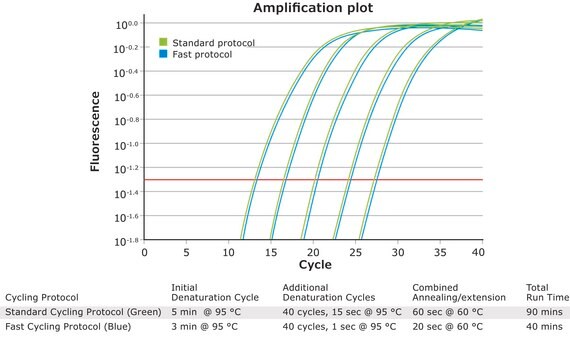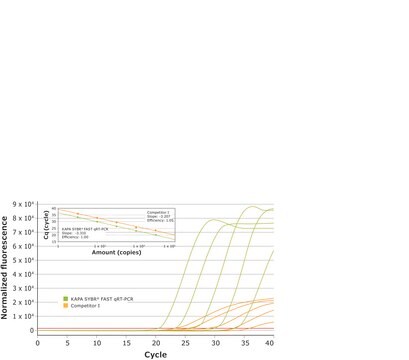S4438
SYBR® Green JumpStart™ Taq ReadyMix™
for quantitative PCR, MgCI2 in buffer
Synonym(s):
Hot start PCR master mix, sybr green PCR master mix, sybr green qPCR
About This Item
Recommended Products
Quality Level
form
liquid
usage
sufficient for 100 reactions
sufficient for 20 reactions
sufficient for 500 reactions
feature
dNTPs included
hotstart
concentration
1.25 units/reaction (50 μL reaction volume)
technique(s)
qPCR: suitable
input
purified DNA
suitability
suitable for (quantitative PCR)
application(s)
agriculture
compatibility
ABI 7000
ABI 7300
ABI 7500 Fast
ABI 7500
ABI 7700
ABI 7900 HT Fast
ABI 7900 HT
ABI 7900
ABI StepOne
ABI StepOnePlus
ABI ViiA 7
Bio-Rad CFX384
Bio-Rad CFX96
Bio-Rad MJ Chromo4
Bio-Rad MJ Opticon 2
Bio-Rad MJ Opticon
Bio-Rad MiniOpticon
Bio-Rad MyiQ
Bio-Rad iCycler iQ
Bio-Rad iQ 5
Cepheid SmartCycler
Eppendorf® Mastercycler ep realplex
Eppendorf® Mastercycler ep realplex2 S
Illumina Eco qPCR
Qiagen Corbett Rotor-Gene 3000
Qiagen Corbett Rotor-Gene 6000
Qiagen Corbett Rotor-Gene Q
Roche LightCycler 480
Strategene Mx3000P
Strategene Mx3005P
Strategene Mx4000
for use with ABI 5700
detection method
SYBR® Green
shipped in
wet ice
storage temp.
−20°C
Looking for similar products? Visit Product Comparison Guide
General description
Application
- in quantitative PCR (qPCR) to amplify a single area of conservation from all variants of myelin basic protein (mbp), SRY-Box 10 (sox10), and β-actin genes
- in quantitative real-time PCR to detect the accumulation of PCR product at every cycle of amplification
- in routine qPCR amplifications of DNA template and cDNA template
- for amplification of RNA by quantitative real-time reverse transcription-PCR (qRT-PCR)
Features and Benefits
- Delivers the benefits of antibody-inactivated hot-start PCR with SYBR Green detection in a ReadyMix ideal for high throughput applications; only primers and template are required
- JumpStart™ Taq DNA polymerase prevents amplification of non-specific products, resulting in increased efficiency and higher target yield
- SYBR® Green JumpStart™ Taq ReadyMix for SYBR based qPCR is formulated with MgCl2 or packaged with a separate vial for ease of optimization. ReadyMixes are compatible with tube- and plate-based instruments
- This master mix allows consistency from one reaction to the next
- Designed to minimize contamination
- Reduced primer dimers
- Reduced set-up time as compared to manual or wax HotStart® methods
- Allows for room temperature set-up and contains a fluorescent dye, which is ideal for qPCR applications
Packaging
20RXN is packaged as 1 X 500 μL
100RXN is packaged as 1 X 2.5 mL
400RXN is packaged as 1 X 10 mL
500RXN is packaged as 1 X 12.5 mL
Principle
SYBR Green I, a commonly used fluorescent DNA binding dye, binds all double-stranded DNA and detection is monitored by measuring the increase in fluorescence throughout the cycle. SYBR Green I has an excitation and emission maxima of 494 nm and 521 nm, respectively. The instrument settings for ROX reference dye are satisfactory for the measurement of the Reference Dye for Quantitative PCR. Specificity of Sigma′s SYBR based QPCR detection is greatly enhanced by the incorporation of a hot-start mediated taq polymerase, JumpStart Taq.
Legal Information
related product
Signal Word
Warning
Hazard Statements
Precautionary Statements
Hazard Classifications
Aquatic Acute 1 - Aquatic Chronic 1 - Eye Irrit. 2 - Skin Irrit. 2 - Skin Sens. 1
Storage Class Code
10 - Combustible liquids
Flash Point(F)
Not applicable
Flash Point(C)
Not applicable
Certificates of Analysis (COA)
Search for Certificates of Analysis (COA) by entering the products Lot/Batch Number. Lot and Batch Numbers can be found on a product’s label following the words ‘Lot’ or ‘Batch’.
Already Own This Product?
Find documentation for the products that you have recently purchased in the Document Library.
Customers Also Viewed
Articles
qPCR investigates gene expression, amplification, and alterations, crucial for tumor biology and understanding cancer genetics.
Watch these videos to learn how real time or quantitative PCR (qPCR) works and the benefits of both the SYBR Green-based and probe-based methods of qPCR assay.
The polymerase chain reaction is one of the most widely used techniques in molecular biology. The PCR process consists of three main steps, Denaturation, Annealing & Extension
Protocols
Protocol describes amplification of DNA through quantitative PCR with SYBR Green. Consistent batch-to-batch performance can be achieved with large numbers of PCR reactions.
The SeqPlex RNA Amplification kit provides a method for amplification of total RNA or isolated mRNA prior to entry into the workflows of the commonly used deep sequencing platforms.
Our SYBR Green qPCR Protocol is a method designed to detect accurate quantification of gene expression and RT-PCR reactions
Related Content
SYBR® Green I, a commonly used fluorescent DNA binding dye, binds all double-stranded DNA and detection is monitored by measuring the increase in fluorescence throughout the cycle. Explore our LuminoCt® and KiCqStart® products for Fast qPCR or JumpStart™ reagents for conventional qPCR
RT-qPCR detects specific targets with applications in gene expression and pathogen detection.
Our team of scientists has experience in all areas of research including Life Science, Material Science, Chemical Synthesis, Chromatography, Analytical and many others.
Contact Technical Service
















